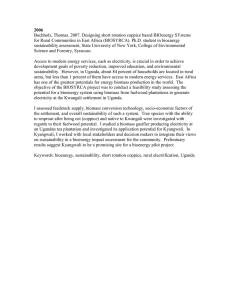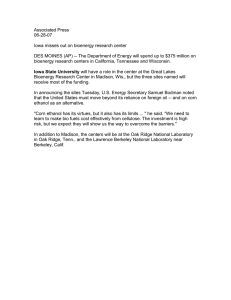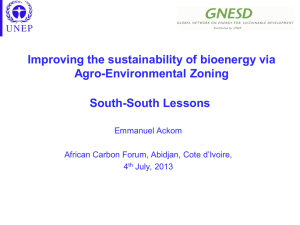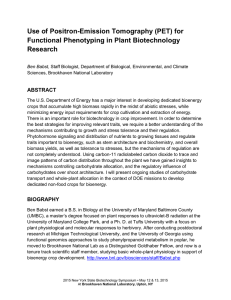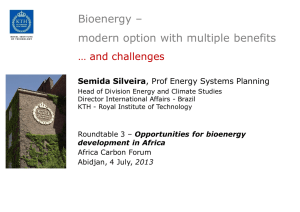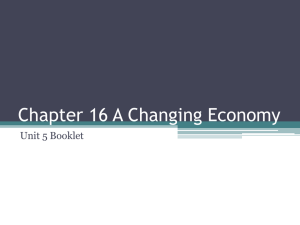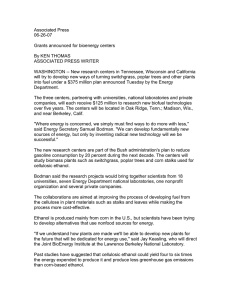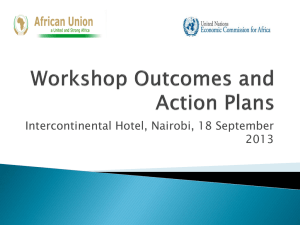Document 10992015
advertisement
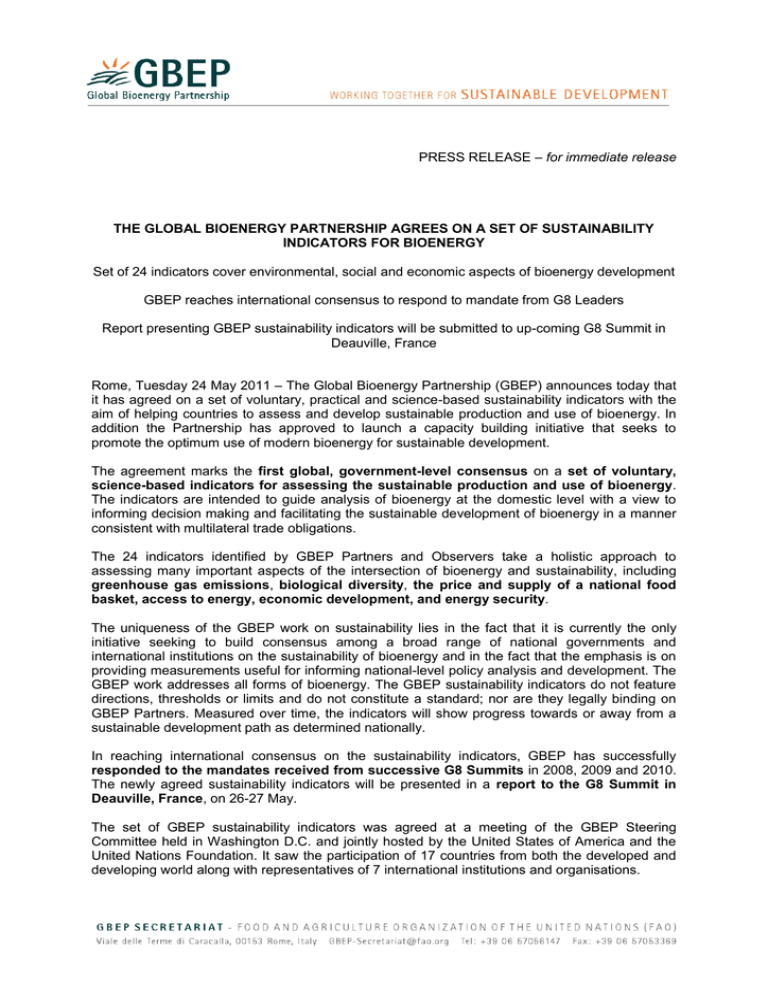
PRESS RELEASE – for immediate release THE GLOBAL BIOENERGY PARTNERSHIP AGREES ON A SET OF SUSTAINABILITY INDICATORS FOR BIOENERGY Set of 24 indicators cover environmental, social and economic aspects of bioenergy development GBEP reaches international consensus to respond to mandate from G8 Leaders Report presenting GBEP sustainability indicators will be submitted to up-coming G8 Summit in Deauville, France Rome, Tuesday 24 May 2011 – The Global Bioenergy Partnership (GBEP) announces today that it has agreed on a set of voluntary, practical and science-based sustainability indicators with the aim of helping countries to assess and develop sustainable production and use of bioenergy. In addition the Partnership has approved to launch a capacity building initiative that seeks to promote the optimum use of modern bioenergy for sustainable development. The agreement marks the first global, government-level consensus on a set of voluntary, science-based indicators for assessing the sustainable production and use of bioenergy. The indicators are intended to guide analysis of bioenergy at the domestic level with a view to informing decision making and facilitating the sustainable development of bioenergy in a manner consistent with multilateral trade obligations. The 24 indicators identified by GBEP Partners and Observers take a holistic approach to assessing many important aspects of the intersection of bioenergy and sustainability, including greenhouse gas emissions, biological diversity, the price and supply of a national food basket, access to energy, economic development, and energy security. The uniqueness of the GBEP work on sustainability lies in the fact that it is currently the only initiative seeking to build consensus among a broad range of national governments and international institutions on the sustainability of bioenergy and in the fact that the emphasis is on providing measurements useful for informing national-level policy analysis and development. The GBEP work addresses all forms of bioenergy. The GBEP sustainability indicators do not feature directions, thresholds or limits and do not constitute a standard; nor are they legally binding on GBEP Partners. Measured over time, the indicators will show progress towards or away from a sustainable development path as determined nationally. In reaching international consensus on the sustainability indicators, GBEP has successfully responded to the mandates received from successive G8 Summits in 2008, 2009 and 2010. The newly agreed sustainability indicators will be presented in a report to the G8 Summit in Deauville, France, on 26-27 May. The set of GBEP sustainability indicators was agreed at a meeting of the GBEP Steering Committee held in Washington D.C. and jointly hosted by the United States of America and the United Nations Foundation. It saw the participation of 17 countries from both the developed and developing world along with representatives of 7 international institutions and organisations. Corrado Clini, GBEP Chair and Director General of Italy’s Ministry for the Environment Land and Sea, commented: “Sustainability is key to ensure that bioenergy will reach its potential. It’s crucial that producing energy from biomass does not compete with food production: energy crops should be in addition to, and not substitute, food crops. Furthermore, the environmental benefit of this kind of energy production has to be clearly greater than the impact that human activity inevitably brings. These GBEP sustainability indicators can help provide consumers with the certainty that the production and use of bioenergy benefits the environment, contributes to social and economic development, and in no way impairs the availability of food.” Mariangela Rebuá, GBEP Co-Chair and Director of the Department of Energy of the Brazilian Ministry of External Relations “congratulated all GBEP Partners for the task accomplished and stressed that the GBEP sustainability indicators is an innovative tool to help policy makers at the domestic level take informed decisions towards the sustainable development of bioenergy in order to mitigate climate change; increase energy security and promote development by encouraging investment, improving infrastructure and increasing productivity and access to energy.” She pointed out that “the new GBEP Working Group on capacity building will be an important forum to advance capacity building in interested countries, including South-South cooperation. Through this effort, different entities will voluntarily partner to develop and implement projects and activities intended to build capacity to optimize the contribution of bioenergy to sustainable development, including feasibility studies for market building activities done in cooperation with interested developing countries.” Daniel Clune, Principal Deputy Assistant Secretary of State for Oceans, International Environment, and Scientific Affairs at the U.S. Department of State, stated: “The United States is honoured to be a founding Partner of GBEP and to work on its mission of promoting the optimum use of modern bioenergy for sustainable development. Modern bioenergy encompasses many technologies that have the potential to not only promote sustainable development, but also help meet two important needs in the developing world by enhancing food and energy security. The latest research shows that when done rationally and thoughtfully, sustainable modern bioenergy creates a virtuous cycle that improves agricultural productivity and draws investments in to expand associated infrastructures and promote economic and social development.” Melinda Kimble, Senior Vice-President of the UN Foundation, that is a founding Partner of GBEP and that kindly co-hosted the GBEP Steering Committee with the US Department of State, noted: “We believe the Steering Committee’s decision to adopt the 24 indicators on sustainable production and use of bioenergy is a major step toward advancing the development of modern, sustainable bioenergy as an important energy source in developing and developed countries. An increasing number of scientific studies reinforce the concept that modern bioenergy holds great promise for improving both rural and urban livelihoods. We know that practical regulatory frameworks and the provision of information, best practices and finance can shape a bioenergy sector that avoids competition with food production; protects and enhances water and soil quality; and reduces greenhouse gas emissions. The work of GBEP is focused on proving and implementing that vision. The consensus on these indicators will support GBEP’s future efforts on capacity-building in developing countries with the goal of realizing the promise of modern bioenergy.” Sven-Olov Ericson, Chair of the GBEP Task Force on Sustainability and Deputy Director at the Swedish Ministry of Enterprise, Energy and Communications, stated: “The GBEP partnership reflects the diversity of bioenergy production and use from an environmental, social as well as economic perspective. Developing a set of indicators that is universally relevant is challenging and has required a collaborative effort. This is why this consensus is unique. The indicators will offer a valuable tool to inform decision making and monitor the contributions of bioenergy to sustainable development.” The list of the 24 indicators is available from the Global Bioenergy Partnership website at http://www.globalbioenergy.org. Note to editors: About the Global Bioenergy Partnership The Global Bioenergy Partnership brings together public, private and civil society stakeholders to implement the commitments taken by the G8 in the 2005 Gleneagles Plan of Action to support "biomass and biofuels deployment, particularly in developing countries where biomass use is prevalent". GBEP and its Partners now comprise 23 countries and 13 international organizations and institutions: Argentina, Brazil, Canada, China, Colombia, Fiji, France, Germany, Ghana, Italy, Japan, Mauritania, Mexico, Netherlands, Paraguay, Russian Federation, Spain, Sudan, Sweden, Switzerland, Tanzania, United Kingdom, United States of America, Economic Community of West African States (ECOWAS), European Commission, FAO, IDB, IEA, UNCTAD, UN/DESA, UNDP, UNEP, UNIDO, UN Foundation, World Council for Renewable Energy (WCRE) and European Biomass Industry Association (EUBIA). A further 22 countries and 9 international organizations and institutions are participating as Observers. The GBEP Secretariat, hosted at FAO Headquarters in Rome with the support principally of Italy, is the co-ordinator of communications and activities. For further information and interview requests: International media enquiries: James Osborne +39 349 793 7853 Italian media enquiries: Lorenza Gallotti +39 (02) 33610690
